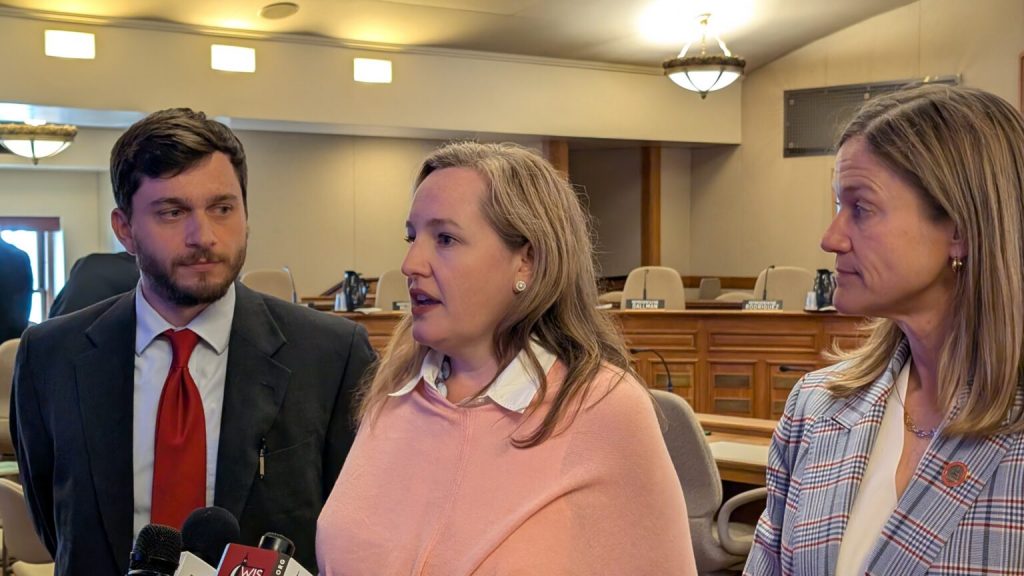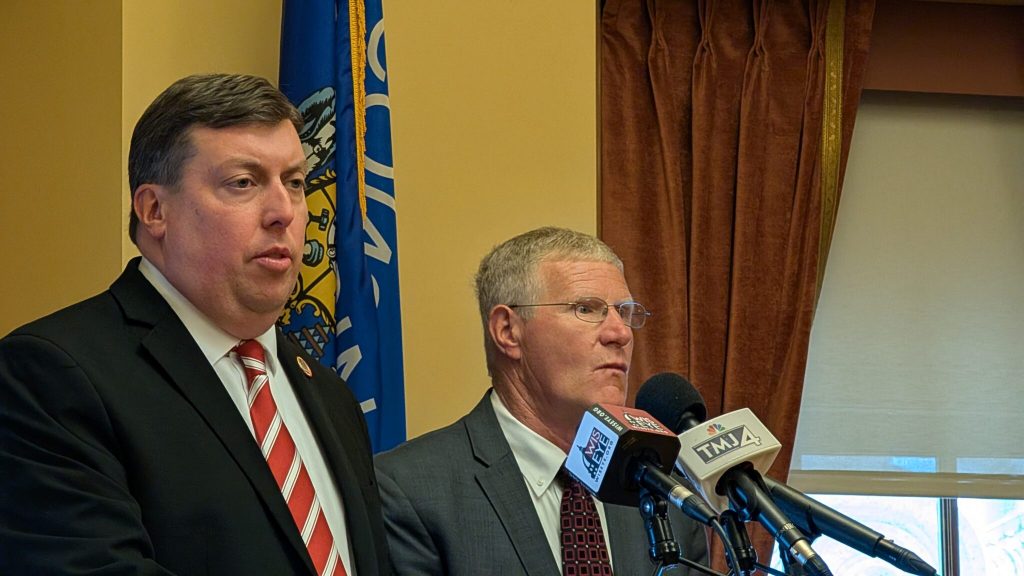Budget Committee Funds Corrections Far Below What Evers Wanted
Democrats say budget won't fix, reform state prison system as needed.

“Republicans would rather have a talking point and try to portray themselves as tough on crime, when really what they are is very stupid and wasteful on crime,” Sen. Kelda Roys said. (Photo by Baylor Spears/Wisconsin Examiner)
GOP lawmakers on the Joint Finance Committee approved a proposal for the Department of Corrections that includes an additional $62.9 million in state spending in 2025-26 and $73.8 million in 2026-27 as well as 18 new staff positions. The proposal was less than a third of the $500 million corrections proposal released by Gov. Tony Evers earlier this year, which he argued was necessary to pass in full in order to accomplish the closure of the Green Bay Correctional Institution.
Evers’ plan, when released, included plans to overhaul the state’s correctional facilities, including closing GBCI, closing Lincoln Hills School for Boys and Copper Lake School for Girls and renovating other facilities as well as expanding earned release and taking steps to address recidivism rates.
“As I’ve talked to the prisons in my district, they’re happy to see that their recruit classes are much larger, and the vacancies are about half of what they were prior to the last budget, so we think that’s working well,” Born said. “The next phase of this is to talk about the capital budget investments, which will happen on Thursday.”
The proposal passed by committee Republicans also includes additional investments in the state’s adult institutions, including $65 million across the biennium for inmate costs, $4 million for contract beds, $5 million for fuel and utilities costs and $292,600 for body cameras. Fox Lake Correctional Institution would get 2.1 million in funding and 16 health care related positions.
Democrats on the committee said the money allocated wouldn’t be enough to lay the groundwork for major reforms to Wisconsin’s correctional system, including shutting down the GBCI. They had introduced a motion that would have added $268.9 million in spending to corrections and 59 staff positions.
Sen. Kelda Roys (D-Madison) noted that previous budgets have spent more on incarceration than on the state’s public universities, and that Republicans’ proposal is half of what Democrats wanted to spend on community reentry.
“Wisconsin is woefully behind the times when it comes to public safety reform and on criminal justice reform,” Roys said. “What’s disappointing about this is to see that we are going to continue to fall far behind. We spend so much money incarcerating people, and that means less money for all the other important things that we want to do in the state.”
Centers dedicated to community reentry will get an additional $1 million under Republican’s proposal.
The centers, Roys said, are a “proven way to reduce recidivism” meaning “reducing the crime as people move back into society.” She also added that the proposal included “no money for supported housing, which we know is one of the biggest barriers for people who are coming out of incarceration and re-entering the community.”
“We don’t have the capacity and the programming and the staffing and the facilities to allow people to successfully reenter and we’re also taking [people] back out of the community after they’ve already re-entered for really minor technical violations. There are a lot of different things that we can safely do to help reduce and right size the prison population… The governor has proposed these things,” Roys said. “Republicans would rather have a talking point and try to portray themselves as tough on crime, when really what they are is very stupid and wasteful on crime.”
Born said the budget proposal voted on Tuesday was focused on the services already provided by the state and not inserting policy into the budget. He said the committee was doing what it needed to to invest in public safety.
“It’s super expensive, and it is what it is because it is a super important part of public safety,” Born said. “Nothing to be sad or upset about and as I would hope most folks know the discussion on the future is in the [capital budget].”
The committee also took up the budgets for district attorneys and public defenders.
The Republican proposal approved on Tuesday adds 42 new assistant district attorney positions, costing $3.5 million in 2025-26 and $2.7 million in 2026-27. The counties with the most new positions include Brown with seven new positions, Waukesha with six positions and Fond du Lac with four. Milwaukee County would get no new positions and Dane County would get one additional position.

Committee co-chair Rep. Mark Born (R-Beaver Dam) said GBCI, which was built in 1898, won’t be discussed until the committee takes up the capital budget later this week. (Photo by Baylor Spears/Wisconsin Examiner)
Republican lawmakers on the committee said the proposal was based on a workload analysis of the Wisconsin District Attorneys Association and should bring the state up to 80% of the staffing in the study. Roys disputed this, noting that Evers based his proposal on the same study, finding that 47 positions would be needed to bring the staffing to 70%.
Roys said the motion was a “nod in the right direction” but said it was missing commensurate increases for public defenders.
Roys also criticized the motion for including no new positions for Milwaukee County, the state’s most populous county, and only one new position in Dane County, the second most populous county. She also expressed concern that Republicans were not considering that federal funds that are currently supporting 30 assistant district attorneys across 28 counties are set to be expended in July.
“The loss of federal funding, I think in some counties, this is going to be very problematic,” Roys said.
“It’s like a 10% increase. What other agencies here are we giving a 10% increase?” Born said. “This is a priority. This is a key investment. I think it’s a positive thing that we were able to do there, but I’m not gonna cry over all our buddies that got ARPA money, [but] didn’t get it now.”
The positions would be anticipated to start in October.
The Republican motion also included investments of nearly $2 million in 2025-26 and nearly $4 million in 2026-27 for pay progression increase for assistant district attorney and deputy district attorneys. The State Public Defender’s office would get $1.9 million in 2025-26 and $3.8 million in 2026-27 for pay progression.
Other investments for district attorneys and public defenders included $3.5 million to upgrade the case tracking system for prosecutors and $858,400 and $922,4000 and 12.5 positions to address workload issues.
The committee also took up the portions of the budget for the Department of Military Affairs, the Public Service Commission and the budget management.
UW budget delayed as deadline approaches
The committee did not take up the budget for the University of Wisconsin system, even though it had been scheduled.
Marklein said leaders “decided not to take it up today” and the co-chairs declined to comment on rumors that lawmakers were preparing a significant cut to the system’s budget.
Roys said she had also heard that Republicans were preparing an $87 million cut to the system and said it would be a “non-starter” for Democrats on the committee.
Roys also said that she thought Republicans were having “difficulty deciding whether they want to walk the plank on making cuts to education.”
“When we do not fund public education, which is again the No. 1 thing that Wisconsinites have asked for consistently over the years, we are going to end up with a state where nobody wants to live,” Roys said. “We can fund prisons all we want, but ultimately, funding early childhood, funding education, funding higher [education] is how we make Wisconsin a great place to live.”
Marklein said he and his colleagues are trying to get the budget passed before the June 30 deadline.
Republicans will be facing a small vote margin if they try to pass the bill with only Republican support. Two members of the Senate have already expressed concerns about the budget crafted so far by the Joint Finance Committee.
Sen. Chris Kapenga (R-Delafield) said that he sees three options: accepting Evers’ budget, approving the one being drafted by the Joint Finance Committee or leaving the current budget in place.
“Unless something improves, I am going with option #3,” Kapenga wrote.
Kapenga said the JFC budget so far includes “unnecessary spending without any reforms that would improve the budget process or dig into wasteful spending currently in place” and said that it would be a major risk to send the budget to Evers because the state Supreme Court hasn’t curbed his veto power.
Kapenga said letting the current budget stand would mean “the lowest spending increase in a decade” and would “have no veto pen risk.”
Sen. Steve Nass (R-Whitewater) had already encouraged the state Legislature last month to either pass no new budget or “a very small mini-budget.” He has a history of voting against the state budget.
Budget committee approves corrections spending significantly lower than what Evers proposed was originally published by the Wisconsin Examiner.
If you think stories like this are important, become a member of Urban Milwaukee and help support real, independent journalism. Plus you get some cool added benefits.




















